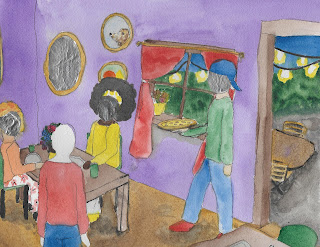In the chapter "The Silenced Dialogue: Power and Pedagogy in Educating Other People's Children," Lisa Delpit discusses the breakdown in communication between dominant groups (primarily white populations), and subordinate groups (primarily people of color) that has resulted in ongoing gatekeeping. Delpit argues that many liberal attempts at empowering subordinate groups are disempowering and instead of resulting in liberation, they limit the skills given to students of color and disqualify them from opportunities where there are gates raised in their way.
It is simply a fact that the way someone presents themselves impacts the opportunities that are open to them. Every day, applicants are barred from employment opportunities because of how they dress, how they speak, and how they spell their names. Gates are closed in their faces daily. However, many of these gates DO have keys that can be given students, and teachers who take responsibility to award these keys make a profound impact in the lives of their students.
Ignoring the presence of these gates in order to be a "nice" person and simply take someone as they are is not the act of kindness it is made out to be. It does not save someone's self esteem. It does not create a world where they have more access. It creates a world where they have less opportunities because it leaves the individual facing enormous gates without the keys to go through and with the sense that they have been lied to about their own identity and potential.
These keys can be explicitly taught, empowering individuals to achieve their goals with less resistance without encroaching on their culture or "whitewashing" individuals. Culture is dynamic and resilient - it is able to hold multiple modes of thought at once and is not so fragile that learning keys like formal grammar, presentation, and professionalism will eradicate it. Distributing keys through direct instruction while celebrating the heritage and background of each individual gives them access to common language and modes of interaction that opens rather than closing doors.
Teachers need to understand that they have the opportunity to be key-keepers or gate-keepers in their classrooms. By explicitly teaching how to navigate the current norms in public society, they can be generous key-keepers, handing out keys to their students while trusting their students to remain authentic to their true selves. Neglecting to instruct students in these areas, however, makes the classroom a place where gatekeeping gains powers. It denies students the tools they need to achieve their goals in a world that is selective about who passes muster, even when done with the intention of respecting a student's background and heritage.
Delpit is very clear, however, that this instruction exists because we are in-between. The gates that exist need to come down, and every opportunity needs to be taken to make this a current reality. To assume the gates are already open, however, does a disservice to students who may graduate and find every door slammed in their face due to the denial of their teachers. While handing students keys, it is just as important to do the work to take down the gates that stand in their way.

.jpg)



Beautiful job holding multiple ideas as true at the same time. Key-Keepers... I will credit you for this. Great metaphor.
ReplyDelete" While handing students keys, it is just as important to do the work to take down the gates that stand in their way." This is a powerful statement! Love the idea of Key - Keepers and taking down the gates.
ReplyDelete